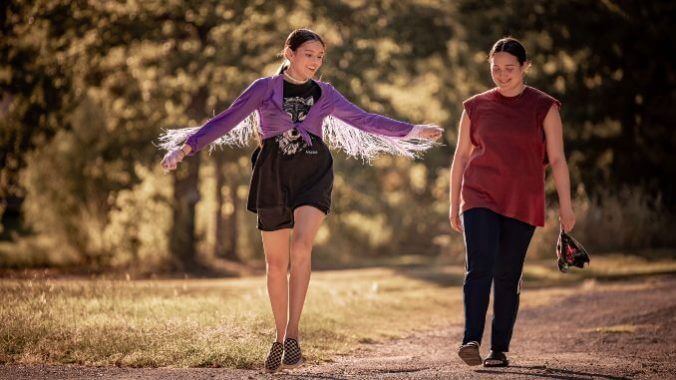Slow-Burn Coming-of-Age Drama Fancy Dance Confronts Stacked Odds Against Indigenous Women
Movies Reviews Sundance 2023
There’s a permeating dryness to Fancy Dance. Not of climate, though the Seneca-Cayuga Reservation in northeast Oklahoma is just as dusty as the rest of the area, but of culture. Those that live there face outrageous cruelties at a methodical pace, so generationally familiar as to be preordained. Mundane. When a woman disappears, the only one with any sense of urgency is her sister, Jax (Lily Gladstone). Even Roki (Isabel Deroy-Olson), the niece now under Jax’s care, doesn’t quite grasp the implications. With quiet charm and an everyday gravity, filmmaker Erica Tremblay tracks the women’s journey, navigating their search in a society that would rather they sit down, shut up and accept that this just Happens Sometimes. Fancy Dance’s coming-of-age investigation is the cinematic equivalent of a low-speed chase, intimately documented from the shoulder, right alongside the busted-up pickup making the pursuing cops rethink their priorities.
Up top, you’ve got to know that Fancy Dance isn’t really a mystery. The statistics are stacked against any Indigenous woman, and you feel the odds in every beat of its plot. This isn’t a revenge thriller a la Catch the Fair One. It isn’t interested in clues and leads. It prioritizes hypocrisy, poverty and plodding monotony. It places us in gas stations, strip clubs, Walmarts, changing rooms, parking lots, and floral living rooms that smell like my grandmother’s Marlboros—hardscrabble environments keen to remind Jax that before she finds her sister, she’ll have to survive.
Roki’s been introduced to the hustler life, jacking white fishermen’s trucks and scamming lookie-loos with Three-card Monte, but is young and free from things like context and consequences. When child protective services decide that Roki would be better served living with her white grandfather Frank (Shea Whigham), she accompanies Jax and holds out hope for her mom, but is mostly concerned with dancing at the upcoming powwow. Her mom will be back in time to dance with her, she just knows it. A second chase begins when the pair leave (Whigham’s role mostly boiling down to instigating claims of kidnapping), and irony abounds as they generate far more law enforcement heat than Roki’s mother ever did. Jax understands this seriousness, absurd as it is. Roki sees it all with fresh eyes, not yet half-lidded and jaded like her aunt’s.
This friction, between Jax’s experience and Roki’s surface understanding, is realistically tragic. Roki knows that her mom is in trouble, but Jax knows that her sister’s fate grows more dire with every passing second. Roki knows how to steal, but Jax knows when to. Roki knows not to trust the police, but Jax knows to fear them. Fancy Dance derives an atmospheric sadness from us seeing that one is destined to grow into the other, because the alternative is to simply vanish. But it’s more complicated than that. This trajectory isn’t without dignity, without value. An endearing sidebar where Roki gets her first period showcases the humor and positivity inherent to the relationship, and reminds us just how deadening it must be for this side of it to be relegated to the backburner so frequently. Fancy Dance unfolds this relationship slowly and indirectly, which won’t be for everyone, but the intimacy of the narrative reveals how the script influences Tremblay’s direction rather than the other way around.
Flashy framings are uncommon, with the camera far more likely to linger on conversational two-shots, and a few key moments of claustrophobia showcase the threatening flipside to its camera’s familiar closeness. But with Tremblay and Miciana Alise’s writing style can come inelegance—when their dialogue breaks free from realism and pushes into more figuratively laced conversations, like when colonization takes form as a pair of ballet flats and dance lessons attempt to usurp the tribe’s traditions—and stiltedness. Gladstone tries to balance this. Her turn as Jax, safe behind her butch button-downs and stoic face, radiates a reluctant tenderness, especially when she’s with one of her sister’s co-workers from the strip club with whom she’s romantically involved. She can’t help but stick her neck out, and Gladstone’s wary steadiness conveys all the buried experience and passion informing these risky moves.
Fancy Dance’s bottled-up tension finally bursts in its great final sequence, but both emotional versions—stuffed way down like a Midwestern dad or let loose and kineticized like Denis Lavant in Beau Travail—are equally honest. Outlining a cycle is inherently unsatisfying, even if it still finds moments to sink your heart, but Tremblay’s film does it on its own terms. Frayed ends of the plot wave freely, some lines sink like stones, and some sequences are so hands-off as to be nearly impressionistic, but the final, overwhelming display of motion and feeling—one that settles from the chaotic fear of loving to the familiar order of mourning—is worth all of the movie’s growing pains.
Director: Erica Tremblay
Writer: Erica Tremblay, Miciana Alise
Starring: Lily Gladstone, Isabel Deroy-Olson, Ryan Begay, Shea Whigham, Audrey Wasilewski
Release Date: January 20, 2023 (Sundance)
Jacob Oller is Movies Editor at Paste Magazine. You can follow him on Twitter at @jacoboller.
For all the latest movie news, reviews, lists and features, follow @PasteMovies.